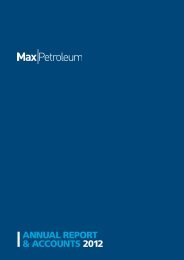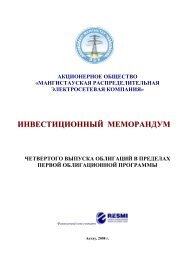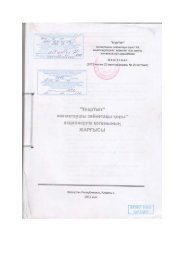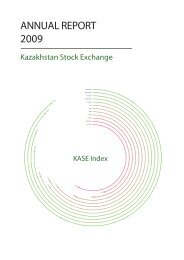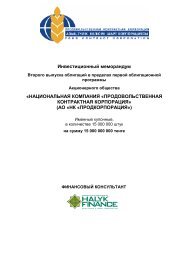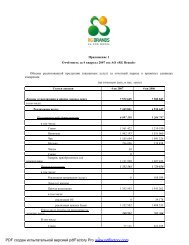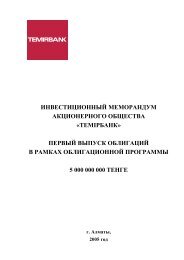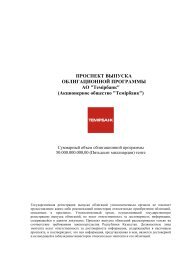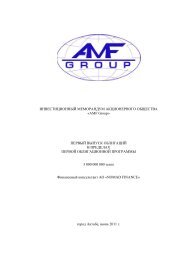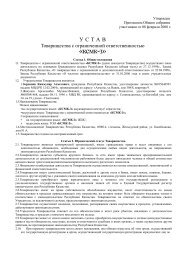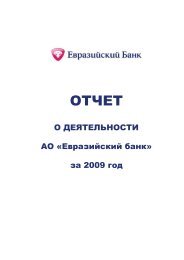JPMorgan - KASE
JPMorgan - KASE
JPMorgan - KASE
Create successful ePaper yourself
Turn your PDF publications into a flip-book with our unique Google optimized e-Paper software.
Issuer may, at its option and at any time, elect to have the obligations of the Issuer and any<br />
Guarantor released with respect to certain covenants that are described in the Indenture<br />
(“Covenant Defeasance”) and thereafter any omission to comply with such obligations will not<br />
constitute a Default or Event of Default with respect to the Notes. In the event that Covenant<br />
Defeasance occurs, certain events (not including non-payment, bankruptcy, receivership,<br />
rehabilitation and insolvency events) described under “Events of Default” will no longer<br />
constitute an Event of Default with respect to the Notes.<br />
In order to exercise either Legal Defeasance or Covenant Defeasance, (a) the Issuer must<br />
irrevocably deposit with the Trustee, in trust, for the benefit of the Holders of the Notes, cash in<br />
U.S. dollars, non-callable Government Securities, or a combination thereof, in such amounts as<br />
will be sufficient, in the opinion of a nationally recognized firm of independent public<br />
accountants, to pay the principal of, premium, if any, and interest, if any, on the outstanding<br />
Notes on the stated maturity; (b) in the case of Legal Defeasance, (1) the Issuer will have<br />
delivered to the Trustee an Opinion of Counsel in the United States reasonably acceptable to the<br />
Trustee confirming that (A) the Issuer has received from, or there has been published by, the<br />
Internal Revenue Service a ruling or (B) since the date of the Indenture, there has been a change<br />
in the applicable U.S. federal income tax law, in either case to the effect that, and based thereon<br />
such Opinion of Counsel will confirm that, the Holders of the outstanding Notes will not<br />
recognize income, gain or loss for U.S. federal income tax purposes as a result of such Legal<br />
Defeasance and will be subject to U.S. federal income tax on the same amounts, in the same<br />
manner and at the same times as would have been the case if such Legal Defeasance had not<br />
occurred, (2) the Issuer will have delivered to the Trustee an Opinion of Counsel in the<br />
Netherlands, Kazakhstan and Canada reasonably acceptable to the Trustee confirming that the<br />
Holders of the outstanding Notes will not recognize income, gain or loss for Dutch, Kazakhstani<br />
or Canadian tax purposes as a result of such Legal Defeasance and will be subject to Dutch,<br />
Kazakhstani and Canadian tax on the same amounts, in the same manner and at the same times<br />
as would have been the case if such Legal Defeasance had not occurred and (3) the Issuer shall<br />
have delivered to the Trustee an Opinion of Counsel to the effect that, under the laws in the<br />
United States, the Netherlands, Kazakhstan and Canada in effect at the time of such deposit,<br />
payments made from the defeasance trust referred to in clause (a) above would not require the<br />
payment of Additional Amounts; (c) in the case of Covenant Defeasance, the Issuer will have<br />
delivered to the Trustee an opinion of counsel in the United States reasonably acceptable to the<br />
Trustee confirming that the Holders of the outstanding Notes will not recognize income, gain or<br />
loss for U.S. federal income tax purposes as a result of such Covenant Defeasance and will be<br />
subject to U.S. federal income tax on the same amounts in the same manner and at the same<br />
times as would have been the case if such Covenant Defeasance had not occurred and the Issuer<br />
will have delivered to the Trustee an Opinion of Counsel in the Netherlands, Kazakhstan and<br />
Canada reasonably acceptable to the Trustee confirming that the Holders of the outstanding<br />
Notes will not recognize income, gain or loss for Dutch, Kazakhstani or Canadian tax purposes as<br />
a result of such Covenant Defeasance and will be subject to Dutch, Kazakhstani and Canadian tax<br />
on the same amounts, in the same manner and at the same times as would have been the case if<br />
such Covenant Defeasance had not occurred; (d) no Default or Event of Default will have<br />
occurred and be continuing on the date of the deposit referred to in clause (a) above (other than<br />
a Default or Event of Default resulting from the borrowing of funds to be applied to such<br />
deposit) or insofar as Events of Default from bankruptcy or insolvency events are concerned, at<br />
any time in the period ending on the 366th day after the date of deposit; (e) such Legal<br />
Defeasance or Covenant Defeasance will not result in a breach or violation of, or constitute a<br />
default under any material agreement or instrument (other than the Indenture) to which the<br />
Company or any of its Subsidiaries is a party or by which the Company or any of its Subsidiaries is<br />
bound; (f) the Issuer must have delivered to the Trustee an Opinion of Counsel to the effect that<br />
on the 366th day following the deposit referred to in clause (a) above, the trust funds will not be<br />
subject to the effect of any applicable bankruptcy, insolvency, reorganization or similar laws<br />
affecting creditors’ rights generally; (g) the Issuer must deliver to the Trustee an Officers’<br />
Certificate stating that the deposit was not made by the Issuer with the intent of preferring the<br />
Holders of Notes over the other creditors of the Issuer with the intent of defeating, hindering,<br />
delaying or defrauding creditors of the Issuer or others; (h) the Issuer shall have taken any action<br />
117



